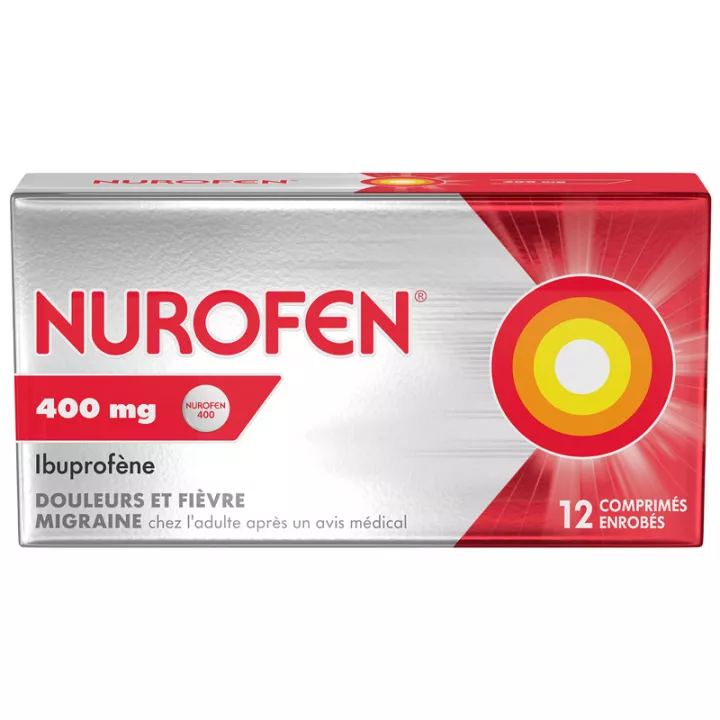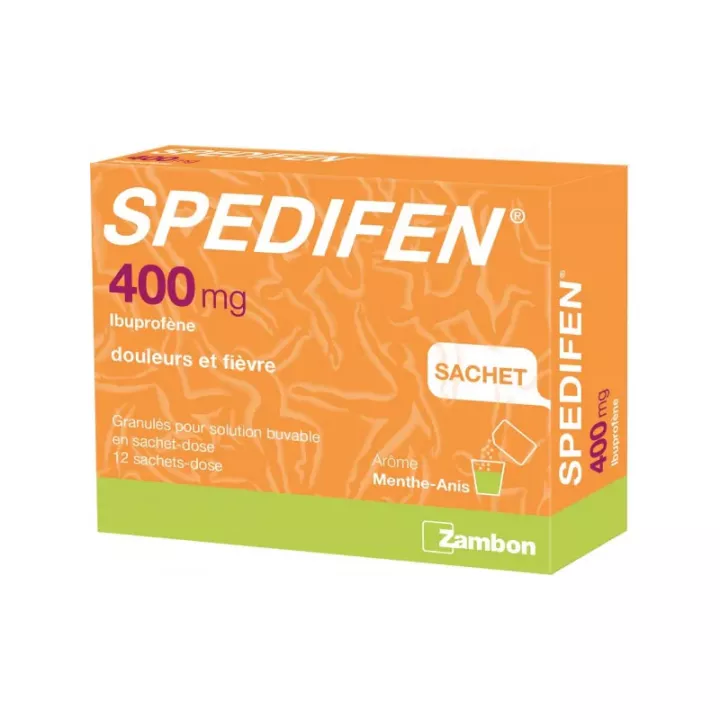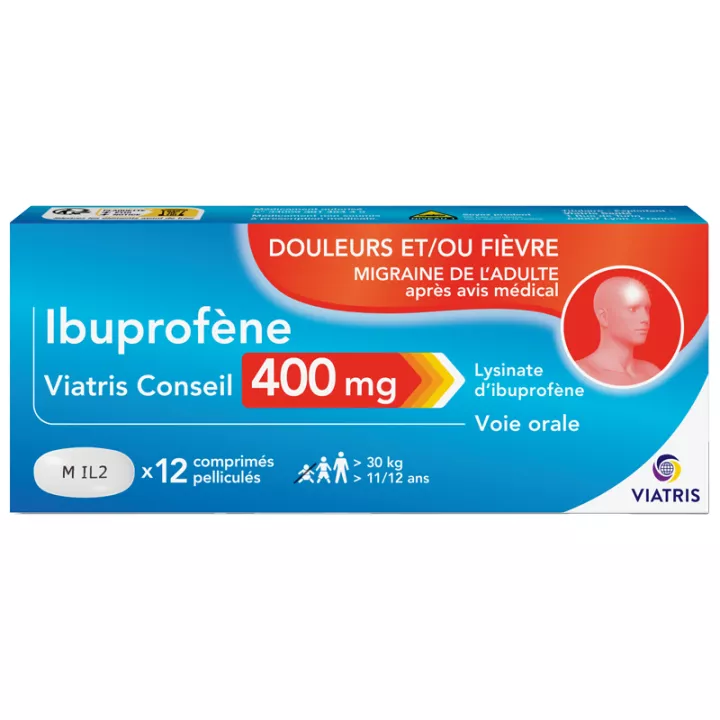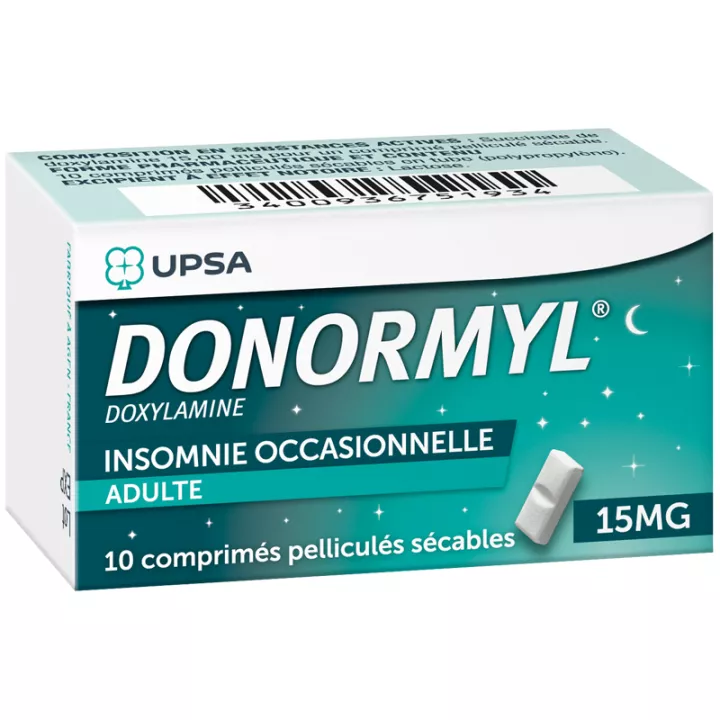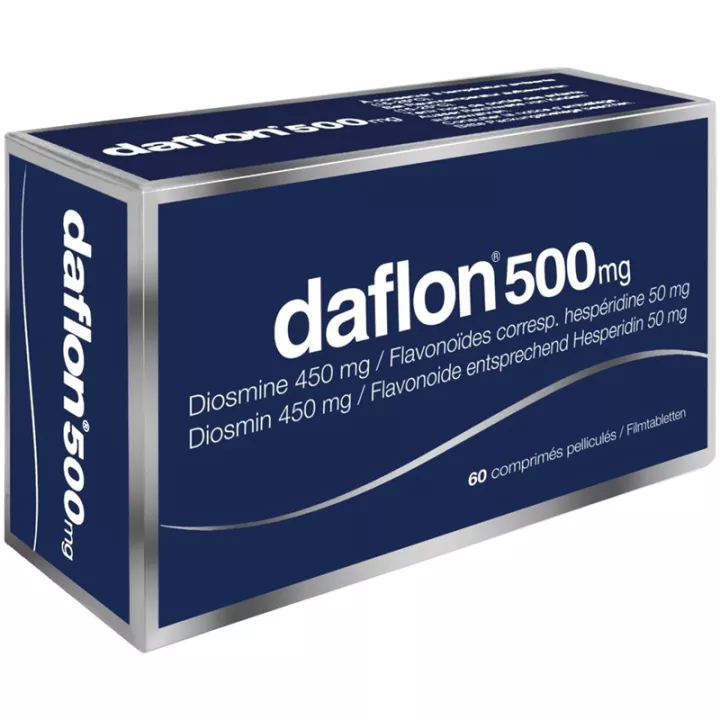NOTICE
ANSM - Updated on: 02/05/2017
Description of the Medicine
NUROFEN 400 mg coated tablet
Ibuprofène
© framed
Read this leaflet carefully before taking this medication. It contains important information for you.
You should always take this medication by strictly following the information provided in this leaflet or by your doctor or pharmacist.
AT· Keep this leaflet. You might need to read it again.
AT· Contact your pharmacist for advice or information.
AT· If you experience any undesirable effects, talk to your doctor or pharmacist. This also applies to any undesirable effects not mentioned in this leaflet. See section 4.
AT· You should contact your doctor if you experience no improvement or feel less well after:
- 3 days in child and adolescent
- 3 days in case of fever, 5 days in case of pain, 5 days in painful outbreaks of arthritis, 3 days in case of migraine.
Do not allow this medication to reach children.
What is in this leaflet?
1. What is NUROFEN 400mg, coated tablet and in which cases is it used?
2. What information should I take before taking NUROFEN 400mg, coated tablet?
3. How to take NUROFEN 400mg, coated tablet?
4. What are the possible undesirable effects?
5. How to store NUROFEN 400mg, coated tablet?
6. Contents of the package and other information.
1. WHAT IS NUROFEN 400 mg, coated tablet AND WHAT IT IS USED FOR?
OTHER ANALGESICS AND ANTIPYRETICS - ATC code: M0AE01 / N02B
This medication contains a non-steroidal anti-inflammatory drug: ibuprofen. It is indicated in adults and children from 30 kg (approximately 11-12 years), in the short-term treatment of fever and / or pain such as headache, Dental pain, aches and painful rulers.
It is indicated in adults , after at least one medical opinion , in the treatment of the migraine attack light or moderate, with or without aura.
It is indicated in the adult , after at least one medical opinion , in the symptomatic treatment of painful outbreaks of osteoarthritis.
2. BEFORE YOU TAKE NUROFEN 400 mg, coated tablet?
If your doctor has informed you of an intolerance to certain sugars, contact him / her before taking this medication.
This medicine contains sodium. This medication contains 1.1mmol (or 25.3mg) sodium for 1 tablet of NUROFEN. To be taken into account in patients controlling their sodium dietary intake.
Never take NUROFEN 400mg, coated tablet
AT· if you are allergic to the active substance or to any of the other ingredients of this medication mentioned in section 6.
AT· after 5 months of pregnancy retrovirus (24 weeks of amnorrhea),
AT· history of allergy or asthma triggered by taking this medication or a related medication, including other non-steroidal anti-inflammatories, acne tylsalicylic acid (aspirin), rhinitis, swelling or urticaria,
AT· allergy to the other constituents of the tablet,
AT· past history of gastrointestinal bleeding or ulcers associated with previous NSAID treatments,
AT· ulcer or bleeding of the stomach or intestine in an evolving or recurrent manner,
AT· gastrointestinal haemorrhage, brain haemorrhage or other ongoing hemorrhage,
AT· severe liver disease,
AT· severe kidney disease,
AT· serious illness of the heart,
AT· lupus erupted mateux disseminated.
IN CASE OF DOUBT, IT IS ESSENTIAL TO REQUEST THE NOTICE OF YOUR DOCTOR OR
OF YOUR PHARMACIST.
Warnings and Precautions
Talk to your doctor or pharmacist before taking NUROFEN 400mg, coated tablet.
In high doses, greater than 1200 mg / day, this drug has anti-inflammatory properties and can cause serious discomforts which are those observed with anti-inflammatory medications -inflammatory non-steroidal.
Anti-inflammatory / analgesic medicines such as ibuprofen are likely to be associated with a slightly increased risk of heart attack or stroke, especially when they are used in high doses. Do not exceed the recommended dose or duration of treatment.
Discuss your treatment with your doctor or pharmacist before taking NUROFEN 400 mg coated tablets if you :
- have heart problems, heart failure, angina pectoris (chest pain), or if you have had a heart attack, surgical bypass surgery, peripheral arterial disease (poor circulation in the legs or feet due to narrow or blocked arteries) or any kind of cerebral vascular accident (including "mini-stroke" or transient ischemic attacks (AIT) )
- have high arterial blood pressure, diabetes, high cholesterol, family history of heart disease or stroke, or if you Are smoking.
There is a risk of renal insufficiency in dehydrated children and adolescents.
If you are a woman, NUROFEN 400 mg, coated tablet can alter your fertility. Its use is not recommended in women who wish to conceive a child. For women who have difficulty breastfeeding or in which breast function tests are ongoing, please tell your doctor or pharmacist before taking NUROFEN 400 mg tablet ©.
Elderly subjects present a higher risk of undesirable effects, particularly for gastrointestinal haemorrhages, ulcers and perforations. Rinal, hepatic and cardiac functions should be closely monitored. The dosage should be as low as possible for the shortest time needed to relieve symptoms.
The use of this medication is advised in patients with fructose intolerance, glucose-galactose malabsorption syndrome or sucrase / isomaltase deficiency (heterosexual Rare).
BEFORE YOU USE THIS MEDICINE, CONSULT YOUR DOCTOR IN CASE:
AT· history of asthma associated with chronic rhinitis, chronic sinusitis or polyps in the nose. Administration of this specialty may lead to an asthma attack, particularly in certain individuals allergic to acetylsalicylic acid (aspirin) or to a non-steroidal anti-inflammatory drug ( see section " Never take NUROFEN 400 mg, coated tablets in the following cases " ),
AT· coagulation disorders, and anticoagulant therapy. This medication can cause severe gastrointestinal manifestations,
AT· of digestive antecedents (hiatal hernia, digestive haemorrhage, stomach or duodenum ulcer),
AT· heart disease, liver or kidney disease,
AT· of varicella. This medication is disregarded due to exceptional severe skin infections,
AT· concomitant therapy with other medicines that increase the risk of peptic ulcer or haemorrhage, eg oral corticosteroids, antidepressants (SSRIs, serotonin reuptake inhibitors), medicines that prevent the formation of blood clots such as aspirin or anticoagulants such as warfarin. If you are in any of these conditions, consult your physician before taking NUROFEN 400 mg, coated tablet ( see section "Take or use other medicines" ),
AT· concomitant therapy with methotrexate at doses greater than 20 mg per week or with pemetrexed ( see section "Other medicines taken or used" ).
DURING TREATMENT, IN CASE OF:
AT· of vision problems, PREVENT YOUR DOCTOR,
AT· gastrointestinal haemorrhage (discharge from the mouth or stool, stool coloration in black), STOP TREATMENT AND IMMEDIATELY CONTACT AN EMERGENCY MEDICAL OR MEDICAL SERVICE,
AT· of appearances of cutaneous or mucous signs which resemble a burn (redness with bubbles or blisters, ulcerations), STOP THE TREATMENT AND CONTACT IMMEDIATELY A DOCTOR OR AN EMERGENCY MEDICAL SERVICE,
AT· signs of allergy to this medication, including an asthma attack or abrupt swelling of the face and neck ( see section "What are the possible undesirable effects?" ), STOP TREATMENT AND CONTACT IMMEDIATELY AN EMERGENCY MEDICAL OR MEDICAL SERVICE.
This medication contains a non-steroidal anti-inflammatory drug: ibuprofen . Do not take this medication at the same time as medicines containing non-steroidal anti-inflammatory drugs (including selective cyclooxygenase 2 inhibitors) and / or l acetylsalicylic acid (aspirin). Read the leaflets for other medicines you are taking to ensure that there are no non-steroidal anti-inflammatories and / or acetylsalicylic acid (aspirin). |
Other medicines and NUROFEN 400mg, coated tablet
Inform your doctor or pharmacist if you are taking or have recently taken or could take any other medicines.
Always inform your doctor, dentist or pharmacist if you are taking any of the following medications in addition to NUROFEN 400 mg coated tablet:
AT· aspirin (acetylsalicylic acid) or other non-steroidal anti-inflammatory drugs
AT· © corticostà roïdes
AT· lithium
AT· mà © methotrexate
AT· Angiotensin converting enzyme inhibitors, diuretics, beta-blockers and angiotensin II antagonists
AT· some antidepressants (selective inhibitors of serotonin reuptake)
AT· pemetrexed
AT· ciclosporin, tacrolimus
AT· other non-steroidal anti-inflammatory drugs (NSAIDs), including selective cyclooxygenase-2 inhibitors
AT· Medicines used to treat pain and inflammation (example) acetylsalicylic acid unless low doses have been advised by the physician
NUROFEN 400 mg coated tablet is likely to affect or be affected by certain other medicines. For example :
anti-coagulant medications (ie, which fluidize the blood / prevent the appearance of clots such as aspirin / acetylsalicylic acid, warfarin, ticlopidine)
medicines that reduce high blood pressure (ACE inhibitors such as captopril, beta-blockers like atenolol, angiotensin receptor antagonists, II as losartan)
Some other medicines are also likely to affect or be affected by treatment with NUROFEN 400 mg coated tablets. Therefore, you should always seek advice from your doctor or pharmacist before using NUROFEN 400 mg coated tablets at the same time as other medicines.
AT· Cardiac glicosides such as digoxin which are medicines used in many heart pathologies because their effects can be increased.
AT· Mifepristone (a medication used for termination of pregnancy). NUROFEN should not be used within 8-12 days after taking mifepristone, as the effect of mifepristone may be reduced .
AT· Zidovudine (a drug for AIDS treatment) because with the use of NUROFEN there is an increased risk of hemarthrosis and hemoma in HIV-infected hemophiliac patients.
NUROFEN 400 mg, coated tablet with food and drink and alcohol
Not applicable.
Pregnancy, breast-feeding and fertility
If you are pregnant or breastfeeding, think you may be pregnant or plan a pregnancy, ask your doctor or pharmacist for advice before taking this medication.
Pregnancy
During the first trimester of pregnancy (12 weeks of amorrhoea, 12 weeks after the 1st day of your last menstrual period), your physician may be required, if necessary , To prescribe this medication.
For 2.5 to 5 months of pregnancy (12 to 24 weeks of amorrhoea), this medication will only be used on the advice of your doctor and in brief hold. Prolonged use of this medication is strongly disliked.
You should NOT take this medication in any way after 5 months of pregnancy (beyond 24 weeks of amnorrhea), as its effects on your child may be especially on a cardiopulmonary and renal plane, and even with a single intake.
If you have taken this medication while you are more than five months pregnant, please speak to your obstetric gynecologist to ensure that appropriate monitoring is available.
feeding
This medication passes into breast milk. As a precautionary measure, it should be avoided during lactation.
Female Fertility
NUROFEN 400 mg belongs to the class of medicines likely to impair fertility female. However, this effect is reversible at the end of treatment. Avoid taking this medication if you are trying to get pregnant.
Driving and using machines
In rare cases, taking this medication may cause dizziness and impaired vision.
NUROFEN 400 mg coated tablet contains sucrose.
3. HOW TO TAKE NUROFEN 400 mg, coated tablet?
Always take this medication exactly as prescribed in this leaflet or as directed by your doctor or pharmacist. Check with your doctor or pharmacist if in doubt.
Dosage
Painful and / or fever
RESERVED FOR ADULTS AND CHILDREN FROM 30 kg (about 11-12 years).
The usual dosage is 1 tablet (400 mg) per dose, to be renewed if necessary after 6 hours. In all cases, do not exceed 3 tablets per day (ie 1200 mg per day).
The tablet dosed at 400 mg is reserved for more intense pain or fever or not relieved by a tablet dosed with 200 mg of ibuprofen.
Regular holds prevent the spike of fever or pain. They must be spaced at least 6 hours apart.
If the patient has an increased risk of adverse effects, use the lowest dose possible for the shortest period of time required to relieve symptoms.
Do not exceed recommended doses or treatment time (3 days in case of fever, 5 days in case of pain).
The maximum dose is 3 tablets per day (1200 mg).
Pain in osteoarthritis
RESERVED FOR ADULTS.
The usual dosage is 1 tablet (400 mg) per dose, to be renewed if necessary after 6 hours. In all cases, do not exceed 3 tablets per day (ie 1200 mg per day).
Regular holds prevent the spike of fever or pain. They must be spaced at least 6 hours apart.
If the patient has an increased risk of adverse effects, use the lowest dose possible for the shortest period of time required to relieve symptoms.
Do not exceed recommended doses or treatment time (3 days in case of fever, 5 days in case of pain).
The maximum dose is 3 tablets per day (1200 mg).
In the event of a migraine attack
RESERVED FOR ADULTS.
1 tablet 400 mg as soon as possible from the onset of the crisis.
If a patient is not relieved after the first dose, a second dose should not be taken during the same course. However the crisis can be treated with another treatment that is not a non-steroidal anti-inflammatory or aspirin.
If the pain reappears a second dose can be taken provided an 8-hour interval between the 2 takes is respected.
Method and route of administration
Oral use.
Swallow the tablet without chewing it, with a large glass of water, preferably during meals.
Frequency of administration
Systematic catch helps prevent fever and pain. They must be spaced at least 6 hours apart.
Duration of treatment
The duration of use is limited to: AT· 3 days in case of fever, AT· 3 days in case of migraine, AT· 5 days in case of pain. |
In the child and the adolescent
If treatment should be continued for more than 3 days or if symptoms worsen, it is advisable for the patient to consult a physician.
In the adult
If the pain persists more than 5 days or the fever more than 3 days , if they worsen or in case of a new disorder, inform your doctor.
In case of a migraine attack the duration of treatment should not exceed 3 days.
If symptoms persist or if new symptoms appear, seek the advice of your pharmacist or doctor.
If you feel that the effect of NUROFEN 400 mg, coated tablet is too strong or too weak, talk to your doctor or pharmacist.
If you take more than NUROFEN 400 mg, coated tablet you should not have :
In case of accidental overdose or poisoning, STOP TREATMENT AND QUICKLY CONSULT A DOCTOR .
The following signs may occur: Nausea, vomiting, upset stomach, and more rarely diarrhea. Tinnitus, headache, and gastrointestinal bleeding are possible. In cases of more severe poisoning, dizziness, somnolence, rarely excitement, disorientation, convulsions and loss of consciousness can occur. Hyperkalemia, metabolic acidosis and bleeding may occur in very severe poisoning. Acute renal insufficiency, hepatic impairment, hypotension, respiratory depression, cyanosis rarely occur. Aggravation of asthma in asthmatics is possible.
If you forget to take NUROFEN 400 mg, coated tablet:
Do not take a double dose to make up for the single dose that you forgot to take.
If you have any further questions about the use of this medication, ask your doctor or pharmacist for more information.
4. WHAT ARE POSSIBLE SIDE EFFECTS?
Like all medicines, this medication can cause side effects, although not everybody gets them.
The following list of undesirable effects can occur if you are treated with short-term ibuprofen. For long-term treatment or if your doctor prescribes a higher dose, unwanted effects may occur than those described below.
In order to evaluate the side effects, the following frequencies are used:
AT· Very common: Touch more than 1 user out of 10
AT· Frequency: key 1 to 10 users out of 100
AT· Uncommon: Touches 1 to 10 users in 1000
AT· Rare: Touch 1 to 10 users out of 10,000
AT· Very rare: Touch less than 1 user in 10,000
AT· Not known: Frequency is impossible to estimate according to the available data
If any of the following side effects occur, or if any of them worsen or if you notice any effects not listed here, please inform your doctor,
Blood disorders
Very rare : Problems in the production of blood cells, the first signs are: Fever, sore throat, superficial ulcers of the mouth, flu symptoms, extreme fatigue, nasal and cutaneous bleeding. In these cases, you should stop treatment immediately and consult a physician. Avoid self-medication of painkillers or medications that lower the fever (antipyretic medicines).
Immune System Problems
Uncommon : Allergic reactions accompanied by discomfort and urticaria and asthma attacks. You should stop taking NUROFEN and inform your doctor immediately.
Very rare : Severe allergic reactions, signs may include: edema of the face, tongue and throat, shortness of breath, accelerated heart rate, hypotension arterial, State of shock. If any of these symptoms occur, which may happen even when first used, immediate medical assistance is required.
Nervous System Disorders
Uncommon : Headache
Very rare : aseptic meningitis
Not known : dizziness
Eye disorders
Not known : Visual Disorders
Cardiac disorders
Not known : heart failure, edema,
Vascular disorders
Not known : Arterial hypertension
Digestive and intestinal disorders
Uncommon : Abdominal pain, nausea and dyspepsia
Rare : diarrhea, flatulence, constipation and vomiting
Very rare : peptic ulcer, perforation, gastrointestinal haemorrhage, black tarry stools, blood vomiting or dark particles resembling ground coffee , s ulcerative tomatitis, gastritis.
Not known : aggravation of colitis and Crohn's disease.
Hepatic Disorders
Very rare : Liver damage (the first signs can be a skin discolouration).
Not known : hepatitis, increased transaminases.
Skin disorders
Uncommon : various skin rashes
Very rare : Severe forms of skin reactions such as bullous reactions including Stevens-Johnson syndrome, multiforme rhythm and Lyell syndrome.
Not known : infectious complication of skin and soft tissues during chicken pox
Rare Disorders:
Very rare : Renal involvement, papillary necrolype during long-term treatment associated with increased urine output and an edema.
Declaration of side effects
If you experience any undesirable effects, talk to your doctor or pharmacist. This also applies to any undesirable effects not mentioned in this leaflet. You can also report undesirable effects directly via the national reporting system: National Agency for the Safety of Medicines and Health Products (NSAH) and network of Pharmacovigilance Regional Centers - Website: www.ansm.sante.fr
By reporting adverse effects, you are helping to provide more information about the safety of the drug.
5. HOW TO STORE NUROFEN 400 mg, coated tablet?
Keep this medication out of the reach and sight of children.
Do not use this medication after the expiration date stated on the package. The redemption date refers to the last day of that month.
For blister packs (PVC / Aluminum): Store at a temperature not exceeding 30Â ° C.
For tablets blister packed (PVC / PVDC / Aluminum) and for tablets in vial (HDPE): Store at a temperature not exceeding 25 ° C.
Do not throw any medicines into the sewer or with the household garbage. Ask your pharmacist to discontinue the medications you are no longer using. These measures will help to protect the environment.
6. PACKAGE CONTENTS AND OTHER INFORMATION
What NUROFEN 400 mg contains: coated tablet
The active substance is:
Ibuprofen ............................................... .................................................. .............................. 400.00 mg
For a coated tablet.
The other components are:
Steric acid, anhydrous colloidal silica, croscarmellose sodium, sodium citrate, sodium laurilsulfate.
Coating : gum arabic, talc, carmellose sodium, sucrose, macrogol 6000, titanium dioxide (E171).
Red printing ink : shellac (Shellac), red iron oxide (E172), propylene glycol (E1520), ammonium hydroxide (E527), simethicone.
What is NUROFEN 400 mg, coated tablet and contents of the outer packaging
This medication is in the form of a coated tablet.
Box of 10, 12, 14 or 15 tablets.
Not all presentations may be marketed.
Holder of the marketing authorization
RECKITT BENCKISER HEALTHCARE FRANCE
38 RUE VICTOR BASCH
CS 11018
91305 MASSY CEDEX
Operator of the marketing authorization
RECKITT BENCKISER HEALTHCARE FRANCE
38 RUE VICTOR BASCH
CS 11018
91305 MASSY CEDEX
Maker
RECKITT BENCKISER HEALTHCARE INTERNATIONAL LIMITED
NOTTINGHAM SITE
THANE ROAD, NOTTINGHAM
NOTTINGHAMSHIRE, NG 90 2 DB
UK
Names of medicines in the Member States of the European Economic Area
Not applicable.
The last date on which this notice was revised is as follows:
[To be subsequently completed by the Contractor]
<{MM / YYYY}> <{YYYY month}.>
Other
Detailed information on this medicinal product is available on the website of the ANSM (France).
Council for Health Education
"WHAT TO DO IN THE EVENT OF FEVER":
Normal body temperature varies from person to person and ranges from 36.5 ° C to 37.5 ° C. A rise of more than 0.8 ° C is considered a fever.
In adults and children over 20 kg (approx. 6 years): If the condition is too troublesome, you can take a medication containing ibuprofen the dosages indicated.
With this medication, the fever should drop rapidly. Nevertheless :
AT· if other signs appear (such as cutaneous eruption),
AT· if the fever persists for more than 3 days or if it worsens,
AT· if the headache becomes violent, or in case of vomiting,
CONSULT YOUR DOCTOR IMMEDIATELY.
"WHAT TO DO IN CASE OF PAIN":
AT· In the absence of improvement after 5 days of treatment,
AT· If the pain recurs regularly,
AT· If it is accompanied by fever,
AT· If she wakes you up at night,
CONSULT YOUR DOCTOR IMMEDIATELY.
"WHAT TO DO IN THE EVENT OF MIGRAINE":
What is migraine?
Migraine is a disease that results in severe headaches, occurring in seizures, for 4 to 72 hours and can repeat several times a month. It can sometimes be preceded by visual and / or sensory signs called aura (impression of luminosity or flickering of the visual field, illusion that a fly seems to cross the visual field ...).
Migraine or headache? |
By abuse of language one often speaks of migraine in place of a simple headache (cephalal). The following questions can help you identify if you are migraine. You can fill it alone or with the help of your pharmacist. |
1. | Your headache evolves in seizures of a few hours to 3 days (without treatment). |
| Between crises, you do not suffer from the head. | Yes â-¡ | No -¡ |
2. | You have presented at least 5 crises in your life. | Yes â-¡ | No -¡ |
3. | Your headache has at least 2 of the following features: | Yes â-¡ | No -¡ |
| AT· located on one side of the head, AT· pulsatile ("at tape"), AT· increased by effort (climbing a staircase, running, coughing), AT· the painful intensity of the crisis goes from strong to very strong. |
4. | Your headache is accompanied by at least 1 of the following signs: | Yes â-¡ | No -¡ |
| AT· want to vomit or vomit, AT· light (photophobia) and / or noise (phonophobia). |
If you answer YES: |
| AT· to 4 questions: you are surely migraineous AT· To 3 questions: you are probably migraineous AT· To 1 or 2 questions: you are probably not migraineous |
Discuss these results with your doctor so that he can confirm the diagnosis and agree with you the most appropriate treatment.
How to manage crises?
Some elements such as fatigue, stress, food (chocolates, alcohol ...), sensory factors (noise, flashing light, perfumes, etc.) or physiological factors such as © clencher migraine attacks.
Knowledge of the triggering factors as well as the warning signs that can precede the crisis allows early treatment (ideally within an hour of its start and while it is still of light intensity). The earlier the treatment is taken, the more effective it is and often short term (early treatment limits migraine recurrence).
Note on a diary or notebook the date of your seizures and their duration, the intensity of the pain, the possible triggers and the medicines used at each crisis will help your mother To evaluate your migraine and its treatment.
A failure on a first crisis does not necessarily mean a failure on subsequent crises. The efficacy of ibuprofen at 400mg should be evaluated on 2 or 3 seizures. To help you, you can answer the following questions and discuss them with your doctor and pharmacist.
Are you relieved 2 hours after taking? | Yes â-¡ | No -¡ | |
Do you have undesirable effects (digestive or other)? | Yes â-¡ | No -¡ | |
Do you use only one medicine plug? | Yes â-¡ | No -¡ | |
Can you resume your usual activities 2 hours after taking? | Yes â-¡ | No -¡ | |
When to see your doctor?
If most headaches are of benign origin, it should not be ignored that they may be the symptom of sometimes severe ailments requiring specialized treatments.
Consult your physician in the following cases:
AT· any first crisis of headache,
AT· beginning of headache after 50 years,
AT· triggering headaches through physical exertion, intercourse, coughing,
AT· installation of a headache in "thunderbolt": sudden appearance of a headache from one second to the next,
AT· appearance of unusual signs accompanying the headache such as:
o disturbances of balance,
o stiffness of the neck making neck movements difficult or impossible,
o double vision, blurred vision,
o difficult to speak,
o decreased muscle strength, numbness of the arms and legs.
AT· body temperature> at 38Â ° C,
AT· aggravation of headaches,
AT· headache that does not have its usual character,
AT· onset of headaches continuously.

